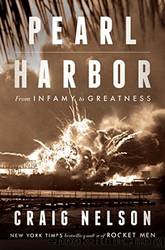Pearl Harbor: From Infamy to Greatness by Nelson Craig

Author:Nelson, Craig [Nelson, Craig]
Language: eng
Format: epub
Tags: Military Action, Infamous Day, Historical Significance, Emotion, Literature, Research, Epic Story, Storyteller, Japan, Battle Fronts, Empathy & Scope, United States, Both Sides of the Story, America, Asia, Attack & Aftermath, State & Local, Seventy-Five Years, History, Personal Experiences, Interviews, Unforgettable Moments, Year 1941, Reporter & Literary Stylist, Anniversary, West, War, 20th Century, Narrative, Personal Recounts, Soldiers, Archival Research
Amazon: B0176M40DM
Goodreads: 29451835
Publisher: Scribner
Published: 2016-09-20T07:00:00+00:00
CHAPTER EIGHT
* * *
DESCRIBING THE INDESCRIBABLE
Honolulu radio station KGMB interrupted its morning broadcast at 8:04 to announce that all military personnel were ordered back to duty, followed by calls for area policemen and firemen and, at 0840, the first American broadcast of World War II: âCalling all nurses! Proceed to Pearl Harbor! Oahu is being attacked! The sign of the rising sun is to be seen on the wings of the attacking planes!â
Soon after, one of Oahuâs leading citizens, Allan Davis, made a private call to that morningâs on-air personality, Webley Edwards. Davis told Edwards that he was making a mistake announcing the attack, that this was all just maneuvers, and America was still at peace. Edwards, having heard so many others insist that the reports were wrong, blew up, saying, âHell, no, this is the real McCoy!â Davis was so shocked that he just mumbled and hung up, but Edwards realized his audience needed to be shocked into the reality of what they were facing and repeated again and again that this was the âreal McCoy.â
Just like so many servicemen, civilians in Hawaii had trouble believing the news, or even their own eyes. Perhaps the most common reaction was that of Yee Kam York, who followed much of the attack with binoculars from just outside Honolulu. He told his wife, âThese Americans, when they have maneuvers, they certainly make it realistic.â KGMB listeners heard the word sporadic used to describe the attacks and thought it was simulated, a common announcement in Honolulu. Others had trouble taking the warning seriously since a popular record getting much radio play at the moment was âThree Little Fishes,â meaning war bulletins were interspersed with down in the meadow in a iddy biddy poo thwam thwee little fishies and a mama fishie too.
When Ethelyn Meyhre heard Webley Edwardsâs announcements, she woke her dad, who laughed, said it must be a joke, and went back to bed. When Federal Bureau of Investigation agent Robert Shivers called director J. Edgar Hoover with the news, Hoover was so incredulous that Shivers held his telephone out the window, so the director could hear the bomb strikes and machine guns.
By 0930 the Honolulu Star-Bulletin had an edition hitting the street with the headline âWAR! OAHU BOMBARDED BY JAPANESE PLANES.â A policeman called editor Riley Allen to warn that some of his more enterprising newsboys had gone out to Pearl Harbor to sell their papers and were in serious danger.
Besides breaking news of the attack as it happened, KGMB warned its listeners: âThe United States Army Intelligence has ordered all civilians stay off the streets. Do not use your telephone. The island is under attack. Stay off the streets. Keep calm. Keep your radio turned on for further news. Get your car off the street. Drive it on the lawn if necessary, just so you get it off the street. Fill water buckets and tubs with water, to be ready for a possible fire. Attach garden hoses. Prepare to take care of any emergency.
Download
This site does not store any files on its server. We only index and link to content provided by other sites. Please contact the content providers to delete copyright contents if any and email us, we'll remove relevant links or contents immediately.
| African Americans | Civil War |
| Colonial Period | Immigrants |
| Revolution & Founding | State & Local |
Cat's cradle by Kurt Vonnegut(15343)
Pimp by Iceberg Slim(14494)
4 3 2 1: A Novel by Paul Auster(12382)
Underground: A Human History of the Worlds Beneath Our Feet by Will Hunt(12094)
The Radium Girls by Kate Moore(12022)
Wiseguy by Nicholas Pileggi(5775)
The Fire Next Time by James Baldwin(5434)
Perfect Rhythm by Jae(5400)
American History Stories, Volume III (Yesterday's Classics) by Pratt Mara L(5303)
Paper Towns by Green John(5184)
Pale Blue Dot by Carl Sagan(5002)
A Higher Loyalty: Truth, Lies, and Leadership by James Comey(4958)
The Mayflower and the Pilgrims' New World by Nathaniel Philbrick(4498)
The Doomsday Machine by Daniel Ellsberg(4489)
Killers of the Flower Moon: The Osage Murders and the Birth of the FBI by David Grann(4447)
The Sympathizer by Viet Thanh Nguyen(4387)
Too Much and Not the Mood by Durga Chew-Bose(4344)
The Borden Murders by Sarah Miller(4318)
Sticky Fingers by Joe Hagan(4192)
